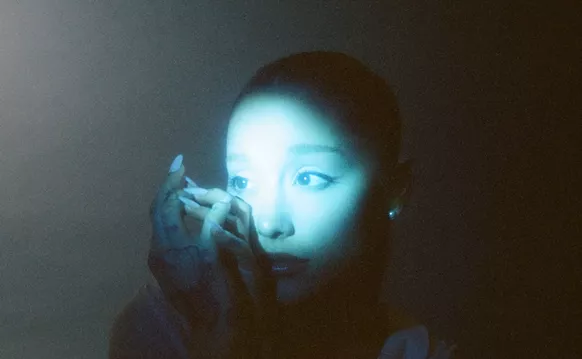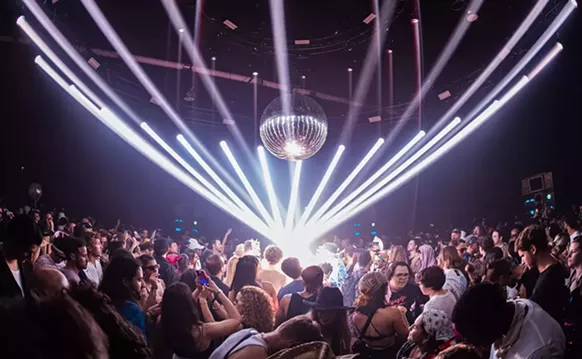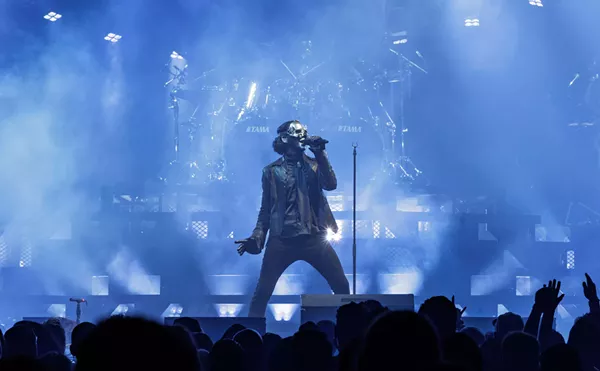In September of 2003, Braden Merrick was an A&R consultant for Warner Bros. and responsible for identifying talent in 11 states on the West Coast. Through a contact in Vegas, he saw the Killers' name on a website that spotlighted up-and-coming local acts. He expected a much different sound than the simple new wave-styled British prog-rock that has since made the band famous.
"The first name that jumped out at me [from the website] was the Killers," Merrick says. "I thought it was an Iron Maiden tribute or something. I listened to a demo, which was an early version of 'Mr. Brightside,' and thought it was great."
But it wasn't until January 2004 — after driving from San Francisco to watch them perform in Las Vegas — that Merrick finally agreed to manage them. Their first step was to record a demo that properly displayed the band's talents. At Merrick's suggestion, the band flew to San Francisco to record with Jeff Saltzman, Green Day's former manager. In four days, they laid down seven tracks, three of which — "Jenny Was a Friend of Mine," "On Top," and "Mr. Brightside" — made the final cut. It was then, Merrick says, not after hearing the first MP3 or even seeing them live, that he understood the band's full potential.
"When we listened to those demos after they had been rearranged and whatnot, we all looked around and smiled and just knew it. We had this feeling it was going to be fucking massive."
Unfortunately, labels didn't share the feeling. Although the EP and Merrick's relationship with Warner earned the band a private showcase in front of label brass, Warner ultimately passed on the band. It was a process that would be repeated many times over in the coming months. Ironically, it was their first brush with rejection that may have played the most vital role in the band's later success.
"A month earlier at South by Southwest, I met Alex Gilbert from 14th Floor Recordings in England, the label owned by Damien Rice," Merrick says. "I gave him the Killers' demo during the conference. He happened to be in Los Angeles when he heard the Killers were doing a showcase [for Warner] and asked if he could get in. My boss said no, because it was a showcase meant for our label only. But he kept pestering me, so I snuck him in. He was really impressed, and when he got back to England, he passed along the demo to Ben Durling [of Lizard King Records]."
While everyone was enthused about the band's music, there was far less certainty about the band's commercial prospects. According to Dom Hardisty, owner of the U.K.-based Lizard King, it wasn't until they played London that those fears disappeared. "We absolutely loved [the EP], but we thought it might actually bankrupt the company," Hardisty says. "They played four London dates, and the number of people at each show doubled every night simply through word of mouth. We had done no marketing whatsoever. We knew that every single person who'd gone to see this band had told all their friends. From that point on, it was simply about maintaining that momentum."
And where did the band members themselves see it all leading? "When I asked [Brandon] about what kind of band he wanted [the Killers] to be, he always gave the same answer," Hardisty says. "'We're the next U2. We're going to do 20 albums, and we're still going to be touring in 30 years' time.' I think deep, deep down, he's always believed he's a star."
Sarah Lewitinn, a renowned blogger who championed the band early on, recalls Flowers' confidence with some amusement: "I was writing for Spin at the time, and I did a 'Next Big Thing' on the band. [In the piece] I called him a fallen Mormon. He called me up and said, 'My mom's going to kill me if she sees that. I can't show it to her, but thanks for writing about us.' I apologized, and he said, 'It's OK. I'll just wait to show her [our] next article in Spin. '"
I was able to witness the band's hubris firsthand when it opened for Stellastarr* on its first nationwide tour. As the first act on a three-band show, the Killers played to only a handful of people at the now-defunct Cotton Club in Atlanta. As far as they were concerned, though, they might as well have been the headline act at Madison Square Garden. With amps cranked to maximum volume and Flowers caked in makeup, the band robotically gyrated to future hits like "Somebody Told Me" and "Mr. Brightside" in hilarious fashion. It was a preposterous display of conviction, even if it seems oddly prescient in retrospect. "Sometimes there's a thin line between madness and self-belief," Hardisty says.
Maybe the real lesson of the Killers' ascendance is that it helps to have a little bit of both.











